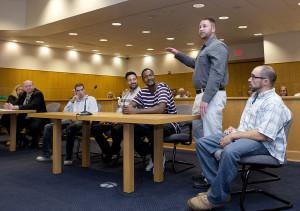By: Chloe Scott
Heroin overdoses and fatalities are happening at an alarming rate in the state of Maryland. According to the sheriff’s office, 32 people in Frederick County died in 2014 from overdosing on heroin and the number is still increasing.
The Frederick County Drug Treatment Court aims to decrease the drug abuse in Frederick County with their redirection programming that holds all substance abusers accountable.
Providing a solution to the increasing fatalities occurring in the county is shifting. The shift is staying away from harsh accountability arrests to redirection programs that still hold abusers accountable, but take into consideration their rehabilitation.

Currently 255 participants are in the Frederick County Drug Treatment Court program. 102 have graduated and 82 have not made it through the program. 60 of those participants are heroin abusers. Frederick County Drug Treatment Court Coordinator, Paul Wolford states “We have seen a daily average increase in participants by 10,” Wolford said.
The Frederick County Drug Treatment Court (DTC) is a voluntary, non-adversarial judicial response to non-violent, drug addicted offenders charged in Circuit Court.
“I, in the role of Coordinator, set on a few different councils and some specifically address the heroin issues in the county,” Wolford said. “My job provides me a way to rehabilitate participants into normal tax-paying citizens.”
Publicly recognizing a crisis that has engulfed the state of Maryland was priority to the Frederick County Court System when it initiated the drug treatment court program in early 2005. Around the time of the program initiation, heroin was on the rise of being a preferred drug for abusers.
Judge Julia Stevenson Solt plays an instrumental part in the upkeep of the programming. She oversees the drug court proceedings, which average to about 30 in docket for drug court every Thursday. Judge Solt also sees participants on a daily basis. Reminding participants that they are humans deserving of a second chance in the program, and not just abusers has been a successful approach Solt and Wolford use to encourage participant completion.
A typical Thursday morning for Judge Solt and Paul Wolford varies from week to week based on the programming phases, which has three phases. Phase one meets every Thursday and aims to stabilize participants with a minimum of 30 consecutive days of sobriety during the 120 day period of the phase. Phase two meets every other week and focuses on continued abstinence and compliance with treatment for phase advancement during a 150 day period. The last phase has staggered meetings and focuses on continued stability, requires participants to participate in the youthful offenders program, and submits a graduation application during a 180 day period.
During the phases, sanctions are also imposed for participants who have either failed a drug test or is not abiding by agreed on policy. Essays, verbal remand, or jail time can be ordered.
Maryland has been coping with the epidemic by establishing a task force. Larry Hogan, Governor of Maryland, established the Heroin and Emergency Task Force to further address heroin abuse in Maryland. Judge Solt was a voice of the 11-member task force created in February 2015. Heroin related deaths have steadily increased from deaths of 464 in 2013 to 578 in 2014.

According to a 2015 task force press release, the task force’s preliminary overdose death count for 2015 included 340 deaths from heroin and 188 deaths from prescription opioids.
A concern for the youth in Frederick County has also been presented to the Frederick County Drug Treatment Court from Frederick County residents. “It is a different animal that involves a tough decision to sanction participants because their parents are still responsible for them,” Wolford said.
The drug court works closely with the youthful offender program, which involves juveniles in danger of going into the system. All-stars from the drug court go and speak to them, giving them possible inspiration that a choice can be made.
Infusing heroin and opioid prevention into additional disciplines is also a priority to the drug treatment court.
Partners include Frederick County Circuit Court, Frederick County State’s Attorney’s Office, Office of the Public Defender, Frederick County Behavioral Health Services – Substance Abuse Services, and Frederick County Law Enforcement Agencies.
Frederick County Sheriff, Sheriff Chuck Jenkins believes that the partnership that law enforcement has with the drug court is a great diversion program with success rates.
“The program gives substance abusers a second chance. It teaches them how treatment can be given and holds them accountable but not by arrest. Arresting the problem solves nothing,” Jenkins said.
To get heroin abusers over relapse, consistent testing and check-ins are performed. Increasing treatment, finding sponsors, and creating a positive support network is said to combat the need for relapse in heroin.
“An estimated 75% of our participants relayed that heroin would be their drug of choice,” Wolford said.
Further efforts to continue to address the issue in Frederick County are being taken into consideration by various disciplines. Frederick County Executive Jan Gardner has formed a Heroin Consortium to bring together county agencies, non-profits, and other community partners to work together to effectively address substance abuse and to reduce overdose and fatalities.
Producing a unified response to the current challenges in the county is the goal of the consortium.
Korey Shorb, Drug Court Treatment Program graduate, continues the goal of a unified response with his local non-profit, Up and Out. “I want to share my story with others. I was addicted to alcohol, marijuana, and heroin. My father called the police on me when he found a heroin package in our home. That was what would be the start of my trips to jail,” Shorb said.
The Drug Treatment Court keeps their rapport with success stories like Shorb. “As for joining in to combat the heroin epidemic, the DTC itself is open to admitting participants addicted to heroin,” Wolford said.